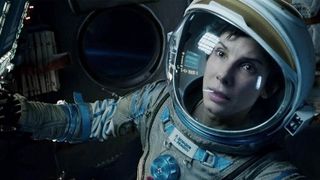Gravity proves there's life in 3D - let's not let Hollywood ruin the tech again
3D can be decent, it just needs to be in the right hands

According to Warner Bros, the takings for Gravity show that a whopping 89% of people have chosen to watch the movie in 3D.
Chosen 3D. These aren't words we thought we would write in the same sentence in 2013, given that it is a technology that has been lambasted by many and proven to be a dud in the home.
But Gravity has shown that if 3D is done right - director Alfonso Cuarón superbly weaves the tech into the fabric of his movie, not tacking it on for money's sake - the public is more than willing to give watching in another dimension another go.
This is how 3D should have been from the start of its rebirth, which began with Avatar back in 2009.
James Cameron promised that the film would use the technology to strengthen the plot, putting 3D first and even creating new cameras to fulfil his wish. By and large, Avatar succeeded as an actual movie. Watching Avatar without 3D is like watching a Technicolor film in black and white, it hobbles the experience.
Instead of Cameron creating a 3D standard that all should adhere to, though, all he did was inadvertently wave dollar signs into the faces of Hollywood execs. They wanted us all to see double so they could double their money.
Hollywood tacked 3D on to movies such as Clash of the Titans and treated the technology as a way to squeeze more money out of movie-goers. It became a premium tax, with glasses used to bump up ticket prices.
Get daily insight, inspiration and deals in your inbox
Get the hottest deals available in your inbox plus news, reviews, opinion, analysis and more from the TechRadar team.
Double vision
This created an unfortunate perfect storm of cinemas demanding movies in 3D, movie studios demanding 3D be added in post and directors tearing their collective hair out as bad 3D was smeared over their well-composed shots.
What directors and cameramen needed to do was take the technology out of the hands of the money men and make 3D relevant again.
Cuarón is the latest in a growing number of directors who are embracing 3D and the positives the technology can bring to a movie.
This is what Cuarón has thankfully achieved and he is the latest in a growing number of directors who are embracing 3D and the positives the technology can bring to a movie.
Before Gravity, Martin Scorsese went meta in his attempt to make 3D work. His vision, Hugo, is a brilliant tale of the birth of movies told using the latest 3D technology the world has to offer. This melding of old techniques with new was what tempted Scorsese to 3D and it shows on the screen.
Ang Lee brought life to Life of Pi with his beautiful use of 3D, again proving that if you work with the technology and not against it, it will pay dividends with the final outcome.
And this is what Cuarón did with Gravity. Even though the film was post-converted into 3D – usually a no no – it used the technology as a character in the movie and not a gimmick.
Gravity is finally another 'event' movie for 3D, perhaps the first proper one since Avatar. So, here's where we plea with Hollywood: you don't get second chances very often, so please don't screw 3D up again this time around.
Instead of looking at Gravity's box office and circling the films already in production that can have 3D slathered on them with no care or real attention, ring up the auteurs, those that truly care about 3D, and ask them to deliver something special.
Or at least, give filmmakers time to perfect 3D. Pacific Rim worked well because Hollywood gave director Guillermo del Toro enough time to get in a 3D expert in to post convert his movie.
After the success of Gravity, let's not fall back down to earth with another Clash of the Titans – give us movies with as much depth as Gravity has and 3D will be here to stay.
- If you don't like 3D, then don't worry as 4K is the new AV king
Marc Chacksfield is the Editor In Chief, Shortlist.com at DC Thomson. He started out life as a movie writer for numerous (now defunct) magazines and soon found himself online - editing a gaggle of gadget sites, including TechRadar, Digital Camera World and Tom's Guide UK. At Shortlist you'll find him mostly writing about movies and tech, so no change there then.
Most Popular



